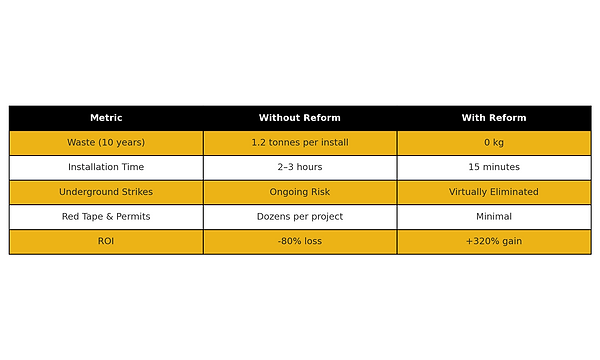Australia’s road authorities are facing a crisis
What once worked, is now dragging departments under a mountain of regulations, paperwork, public scrutiny, and avoidable expenses.
Costs are spiraling, Risks are escalating, and Compliance requirements are growing way more complex.
This work is becoming untenable. Road authorities are stuck in a continual cycle of damage, costly repairs and mounting paperwork.
With growing environmental disasters and rapid urbanisation, we've reached the tipping point, and we cannot "continue with business as usual"
"Business as Usual" Is No Longer an Option
Workers in UK must now undergo salf defence courses and in the USA silicosis is already costing road authorities millions.
Alarming Trends for road authorities
In the UK, frontline road workers are now required to undergo self-defence training, as abuse and assaults rise dramatically on public works crews. In the USA, silicosis claims are skyrocketing, with compensation reaching into the hundreds of millions annually, forcing departments to rethink traditional concrete removal practices.
National Infrastructure Burden (2024):
-
Over $1.2 billion lost annually due to utility strikes and reworks.
-
Workplace injuries in roadworks costing over $640 million per year.
-
Waste management costs are rising 12% annually.
-
Millions in fines and investigations related to poor WHS and EPA compliance.
-
Obligation: Under the Model WHS Act, authorities must ensure the health and safety of all workers.
-
Reality: Traditional methods put workers at risk of body stressing (The number one cause of injury)
-
Reality: Traditional methods put workers at risk of injury spending hours every day working in dangerous traffic (the number one cause of serious workplace injury)
-
Reality: Traditional methods put workers at risk of serious or fatal injury from disturbance to (often poorly marked) dangerous underground services
-
Reality: Traditional concrete installations put workers at risk of silica exposure, with projections suggesting payouts will cost road authorities (esp maintenace sector) millions in the coming years
One serious WHS breach can incur penalties of up to $3.5 million for corporations.
WHS Obligations are mounting
A sign of what's coming:
HSE Fines Surge: UK courts handed out over £35.8 million in health and safety fines in 2023 alone — a 44% increase from the previous year.
HSE random inspections now impact 1 in 5 local road projects
Environmental and waste regulations
Failure to comply with the UK Environment Agency’s waste tracking and disposal regulations can result in fines up to £500,000 and criminal prosecution.
In the USA, the EPA has increased federal fines of up to US$50,000 per day for improper disposal
-
Obligation: The EPA mandates all waste be managed under licensed transport and disposal schemes.
-
Reality: 100% of the concrete and paving used to secure roadside items goes to landfill
-
Reality: Breaking up concrete footings creates waste that requires licensed removal and tipping—costly and time-consuming.
Cost: Landfill levies and tipping fees vary by state but are rising rapidly—up to $250/tonne in some regions.
-
Obligation: Councils and State Road authorities must demonstrate they’ve considered whole-of-life cost, environmental impact, and social outcomes.
-
Reality: Failing to procure sustainable products and implement sustainable practices can result in failed audits, public criticism, and result in spiraling costs
Best-Practice Procurement Standards


Key Efficiency Gains
-
Substantial reduction in worker exposure to high-risk tasks
-
Elimination of waste transport and disposal obligations
-
Minimal traffic management costs
-
Dramatically reduced paperwork and approval delays
Reality: You can reduce your costs and risks by around 80% within 2-3 years.
If changes aren’t made soon, road authorities will face growing exposure to litigation—from injured workers, environmental regulators, and auditors—each with the power to shut projects down or issue crushing penalties.
Expect more:
-
Blowouts
-
Injuries
-
Fines
-
Public scrutiny
-
Burnout
This is a warning. Not a sales pitch.
The system is failing—but there is a better way.
What’s at Stake?
Inaction at this stage could render your organisation or department operationally and financially untenable within a few short years
Let's build a better future
There's good reason the major road developers, Western Power, Department of Transport, and Australia's major Local Government authorities buy our products- it is because our products reduce waste and consumption, improve safety and efficiency and save you money, a LOT of money.
100 %
No replacing valuable footings. Replace damaged items in seconds- no heavy labour for 100 years
Click on arrow and please wait for video to load
With rapid urbanisation and climate change the road construction and particularly the road maintenance sector is undergoing major challenges
This, already difficult work, is about to become more difficult to perform and with rising damage budgets will become even more difficult to manage.
It’s time to take this ridiculously complex job and make it crazy simple
"Our selection is not based on price alone, we also took into consideration the safety and saving aspects. ZERO WASTE Unbreakable Foundations allow quick replacement of items with no further effort required to the base, (providing a significant cost benefit in replacing the damaged item by re-using the existing footing) and reduces risk of injury to employees by reducing time spent on traffic islands exposed to traffic.”
MAIN ROADS DEPT W.A.





